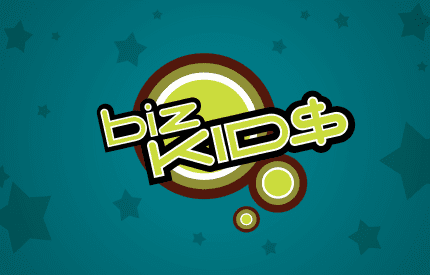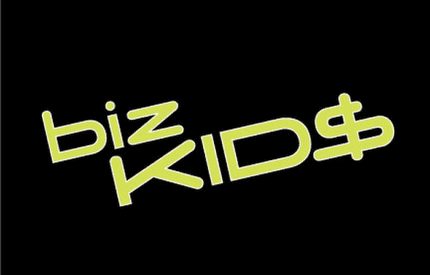|

|

Follow me on a day on the set of Biz Kid$!
http://www.youtube.com/watch?v=c0xYOyOPjCE&feature=channel_page

0Have you ever wondered how much money you’d seriously make as a DJ or Zookeeper? Check out this site: http://www.kids.gov/6_8/6_8_careers.shtml
They tell you about a heck of a lot of jobs, how to get them and how much money you could make. It’s written for 6-8 graders, but it is still a pretty sweet tool if you’re older.

|

Calling all Biz Kid$……we want to see VIDEOS of you running your business or social community project. Maybe you’ll end up in the show, on the website, or in our monthly newsletter. Send your videos (no longer than 3 minutes) to: J9@bizkids.com

|

We were inspired by the stories of these Poughkeepsie teens who put their natural entrepreneurial talents to work helping others in the community. Read about them at:
http://www.poughkeepsiejournal.com/apps/pbcs.dll/article?AID=/20070916/NEWS07/709160321/1011

Follow Intern Andy as he gives you a tour and explanation of BK’s lighting requirements:
http://www.youtube.com/watch?v=e5Uy47tLONU&feature=channel_page

Before Biz Kid$, I used to blow my $$ on whatever I wanted, a new pair of jeans, a purse, movies, gas for my car. But now I think twice about everything I spend my $$ on. I never realized how much my money could grow if I started saving now. Who knows….maybe I’ll be a millionaire by the time I’m……40? Actually, to figure out how long it will take for you to be a millionaire check this out: http://www.youngmoney.com/calculators/savings_calculators/millionaire_calculator

|
Budgets Are a Biz Kid’s Best Buddy Budgets are easy to talk about–but hard to stick with! Find out how to make a budget–and how to follow it, even when there are a million ways to spend your money. It’s all in The Vault, brought to you by Biz Kid$!
What Is a Budget? A budget is a plan for your money. The first step is to figure out your income and your expenses over a certain time period. Then, you adjust those amounts to fit your goals. Keeping to a budget means making decisions. Sometimes, you put off buying something now because it’s not in your budget–and because you have bigger fish to fry!
Fast Fact Even big-time celebrities can get into trouble if they don’t watch their expenses. Match the bankrupt star with their silly purchase.
(Answers: 1-B, 2-A, 3-D, 4-C)
|
|||||||||||||||||||||||||||||||||||||||||||||||||
|
The Tale of Bradley Budget
Brad wants to save up for a class trip to the Grand Canyon–a cool $300. Even though his last name is Budget, Brad has never made one–but if he’s going to go on the trip, he’ll need one, and fast!
Brad works at his dad’s car lot, Budget Autos, detailing used cars after school. He works 10 hours a week and makes $10 an hour. How much does he make per week?
(Hours Worked Per Week) X (Hourly Wage) = Weekly Income 10 X $10 = Weekly Income $100 = Weekly Income
Now he makes a list of expenses. For his monthly cell phone bill, he just divides by four to get a weekly amount.
Brad is spending every penny! He needs to make a budget, and fast. He has three months to save $300. That’s about $25 a week. What should he cut? Here’s the budget Brad came up with:
How much will Brad save if he sticks to his budget?
(Savings per week) x (12 weeks) = Total Savings Amount $25 x 12 = $300
He’ll have enough money to go on the trip–but he had to give up a few things to get it. He could have asked his dad for an extra shift, but Brad decided to cut expenses instead. That’s what budgets are all about–choices!
Tips for Budgeting
|
|||||||||||||||||||||||||||||||||||||||||||||||||
|
Ask John Paul
Q. I want to make a budget, but my expenses occur at different times–daily, weekly, monthly, and yearly. What should I do?
A. A budget is usually built on a monthly basis. First, figure out your monthly income. Next, list all your expenses. There will be expenses that occur weekly, monthly, and yearly. For example, if you have a weekly donut and a yearly subscription to Tennis Magazine (Federer’s awesome), multiply your weekly expense (the donut) by 4, and divide the yearly expense (the magazine) by 12. This will give you a monthly expense for each item. Then, you can compare monthly income vs. monthly expenses. You can do the same thing for a weekly budget–just divide the yearly expense by 52. If you stick to a budget, you’ll always have enough money for your Saturday pastry–and you won’t miss out on Wimbledon, either!
John Paul Pigéon is a 12-year-old financial guru from Fort Worth, Texas, whose mission in life is to inspire financial success in a world of little people. Have a question for John Paul? Send it to askjohnpaul@bizkids.com. Your question may be selected for our next newsletter
|
|||||||||||||||||||||||||||||||||||||||||||||||||
|
Biz Kid$ of the Month The savvy Biz Kids who run the Jazzy Jellyfish Café in Gulf Breeze, Florida, serve up great food for a good cause–all their profits go to charity!
Tell us about your business.
Coles: We sell tickets for dinners to raise money for charity, $12 for adults and $8 for kids. It’s run by our second- and third-grade classes.
Jill: We transform the cafeteria with cool decorations. We serve 150 people a night plus the staff.
What are some of your expenses?
Madison: We have to buy decorations, food, T-shirts, and other supplies. We have to stick to a budget so our profits stay high. How do you decide who does what? Jill: We all applied for jobs.
Madison: I applied for the decorating committee, but I ended up in marketing. Turns out, I really like it.
What’s the most important thing you learned?
Coles: To set high goals for yourself. We originally planned to raise $7,500, but we decided to set a goal of $10,000.
Chase: Also, you make sacrifices to run a successful business. We give up recess and homework time.
Madison: But it’s worth it!
|
|||||||||||||||||||||||||||||||||||||||||||||||||
|
Info to Go
Next Month…
What are you going to do with all the money you saved from sticking to a budget? In next month’s issue of The Vault, you’ll learn all about savings and what to do with them. Don’t miss it!
Send The Vault to a Friend!
If you dig The Vault, send it to your friends–just click the link in the upper right-hand corner of the newsletter. |

Go behind-the-scenes on a Biz Kid$ set with intern Amy:
http://www.youtube.com/watch?v=89CROcDhXlk&feature=channel_page

Last month I was at the Growing Up CEO conference in Boston, where inner-city young entrepreneurs from across the country came together to network, get mentored on their start-ups, and to learn a few tricks from the experts. What an amazing group of kids! They were all so inspiring – especially considering the challenges they’ve had to overcome to be successful. As a result, we will be taking a trip to Baltimore, MD to film a few kids for an upcoming episode. Can’t wait!
If you are an inner-city entrepreneur check out ICIC (Initiative for a Competitive Inner City): http://www.icic.org/site/c.fnJNKPNhFiG/b.3441497/k.907D/Growing_Up_CEO.htm